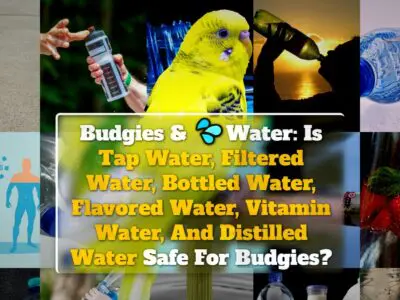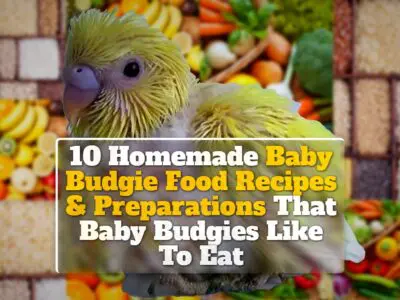Budgies, either adult or fledgling, cannot go without food and water for long due to their high metabolism.
Adult budgies can manage up to 12 hours, but past this point, their condition worsens rapidly.
For baby budgies, the timeline is even shorter, showing signs of weakness and lethargy within just 6 hours of no feeding.
As someone who has raised budgies, I have been frequently asked, “How long can budgies go without food and water?” This question is usually asked by people who will be away from home for a few days.
The answer varies depending on whether we’re talking about adult budgies or their tiny, fluffy fledgling counterparts.
Here’s a comprehensive, hour-by-hour and day-by-day breakdown of what happens when these lively birds are deprived of their basic necessities.
How Long Can Adult Budgies Go Without Food And Water?
When it comes to adult budgies, these lively birds have a high metabolism and eat frequently throughout the day.
So what happens when they can’t access food or water? Here’s a detailed, stage-by-stage explanation, from the first hour up to three days.
Hour 1-12
For the first 12 hours without food or water, an adult budgie can still maintain its energy levels.
You might find it surprising, but these birds have an impressive capability to tap into their energy reserves.
You will probably see your budgie being its usual chirpy self, moving around, and possibly displaying normal behavior.
This resilience, however, won’t last long as the clock continues to tick.
Hour 12-24
After the initial 12 hours, signs of distress start creeping in.
Your budgie may become less active, spending more time resting.
A common response to this stress is fluffing up their feathers, a way to conserve heat as their body starts to feel the impact of no food or water.
Without any intervention at this point, the budgie’s condition can quickly deteriorate.
Day 1-2
Fast forward to the first 24 hours, and into the second day, your budgie will be severely weakened.
The previously active bird now becomes visibly lethargic, may seem disoriented, and will likely stop vocalizing.
It’s a desperate call for help.
Its body starts shutting down as it can no longer function without nutrition.
Organ failure is imminent unless there’s immediate intervention.
Day 2-3
Between the second and third day, the budgie teeters on the brink of death.
The effects of dehydration and starvation have caused significant damage, leading to serious organ failure.
Immediate veterinary attention is now a must.
Unfortunately, even with professional care, the chances of survival are grim.
It’s a somber testament to how crucial regular access to food and water is for these small, vibrant creatures.
How Long Can Baby Budgies Go Without Food And Water?
The story is markedly different when we consider baby budgies, also known as fledglings.
These tiny creatures are still developing, and their need for regular feeding is even more acute.
Let’s examine what happens when a baby budgie goes without food or water for various periods.
Hour 1-6
Baby budgies typically rely on their parents for feeding every 1-2 hours.
So, when deprived of food or water, the first 6 hours can already cause noticeable effects.
Their small bodies begin to lose heat rapidly, their response levels drop, and they grow noticeably weaker.
The chicks’ vulnerability is alarming, as a mere few hours without feeding can lead to drastic changes.
Hour 6-12
During the next phase, from 6 to 12 hours, the situation gets progressively worse.
The baby budgie’s growth starts to decline, its responsiveness reduces, and signs of dehydration begin to appear.
The once active and noisy chick now seems much weaker, displaying clear signs of lethargy.
Hour 12-24
At the 12 to 24-hour mark, the baby budgie’s life hangs in the balance.
Its little body is now severely dehydrated, and essential systems begin to shut down.
The chick’s responses to stimuli will likely be minimal if at all present.
It’s a heartbreaking sight and a critical moment that requires urgent action.
Day 1-2
The scenario at day 1-2 is bleak.
The chick is now in critical condition, and survival without immediate veterinary intervention is highly unlikely.
At this crucial stage of development, a lack of nourishment can lead to irreversible damage or even death.
It’s a stark reminder that baby budgies need constant care and regular feeding to ensure their healthy growth and survival.
Faqs
Diving into the world of budgies brings up a multitude of questions.
Let’s address some of the most frequently asked queries about these fascinating little birds.
Is There A Food Or Drink That Will Keep Budgies Full For A Long Time?
In their natural habitat, budgies thrive on a varied diet of seeds, fruits, vegetables, and even insects.
In captivity, most owners rely on a seed mix along with fresh fruits and vegetables to keep their budgies well-fed.
Unfortunately, no specific food or drink can keep them full for an extended period due to their fast metabolism.
Regular feeding is essential for their health and wellbeing.
How Long Do Budgies Naturally Starve In Their Natural Habitat?
In the wild, budgies usually don’t experience long periods of starvation.
Their natural environment in Australia is abundant with food sources.
However, during extreme weather conditions or environmental changes, food might become scarce.
But, budgies are known for their adaptability and can often find food even in harsh conditions.
What Are The Reasons Why Budgies Cannot Stay Hungry And Thirsty For A Long Time?
Budgies have a high metabolic rate, which means they burn through their food supply quite quickly.
They need to eat often to keep up their energy levels.
If they go without food or water for too long, their bodies begin to shut down, leading to severe health complications or even death.
How Often Do Budgies Eat At Intervals?
Budgies usually eat multiple times throughout the day.
You might observe them nibbling on their food every few hours.
This frequent feeding pattern aligns with their high metabolic rate, requiring them to consume food regularly to maintain energy.
How Often Do Budgies Drink Water At Intervals?
Budgies drink water at least once or twice a day, depending on the temperature and their diet.
If their diet includes fresh fruits and vegetables, they might drink less as they get some hydration from these foods.
However, clean and fresh water should always be available.
How Often Do Baby Budgies Eat At Intervals?
Baby budgies, or fledglings, are typically fed by their parents every 1-2 hours.
At this early stage of their lives, frequent feeding is critical for their growth and development.
How Often Do Baby Budgies Drink Water At Intervals?
Young budgies acquire most of their hydration needs from the food their parents feed them.
As they grow and start to eat independently, they will learn to drink water as well.
Why Do Budgies Need To Eat So Often?
Due to their high metabolic rate, budgies need to consume food frequently to supply the energy their bodies require.
Regular eating helps them maintain their bodily functions, keep their energy levels up, and stay healthy.
What Is The Amount Of Food And Water That Budgies Should Eat Daily?
The daily food requirement for budgies can vary based on their age, size, and activity level.
However, a general guideline is to provide 1.5 to 2 teaspoons of seed mix per budgie daily.
In addition, fresh vegetables and fruits should be part of their diet.
For water, ensure there is always fresh, clean water available for your budgie, replacing it at least once a day.
How Do Budgies Survive Without Food And Water In The Wild?
In their natural habitat, budgies often face periods without access to food and water.
However, they have developed adaptive behaviors to survive these situations.
For instance, budgies may travel vast distances in search of food and water, relying on their stored energy reserves to keep them going.
Despite this, their high metabolic rate means they can’t endure long periods of scarcity, unlike some other bird species.
Can Budgies Drink Any Other Liquid Besides Water For Hydration?
Budgies, like most birds, primarily drink water for hydration.
However, they can also obtain moisture from the fresh fruits and vegetables in their diet.
Despite this, it’s important to remember that these cannot substitute for water entirely.
A constant supply of fresh, clean water is still essential for their health and wellbeing.
How Can You Tell If Your Budgie Is Hungry Or Thirsty?
Budgies show certain signs when they’re hungry or thirsty.
They may become more vocal, exhibit restlessness, or peck at their empty food and water dishes. Physical signs can include a hunched posture, ruffled feathers, and a lack of activity.
What Are The Long-Term Effects Of Malnutrition On Budgies?
Long-term malnutrition in budgies can lead to numerous health problems.
This includes weakened immunity, making them more susceptible to diseases; decreased energy levels, which can affect their activity and behavior; and stunted growth in fledglings.
In severe cases, prolonged malnutrition could lead to organ failure and death.
How Can I Prevent My Budgie From Going Without Food And Water?
Preventing your budgie from going without food and water involves regular feeding, maintaining a balanced diet, and ensuring a constant supply of fresh water.
In addition, monitoring your budgie’s eating and drinking habits can help you spot any changes that might suggest a health problem.
Sources


